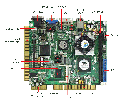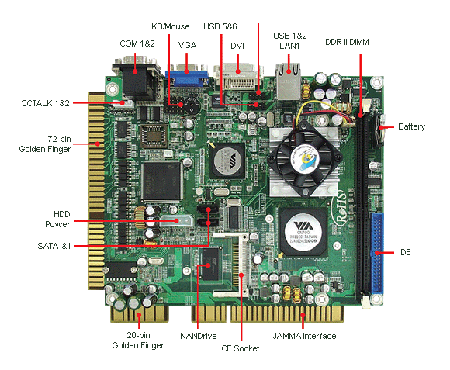Gaming board has Via CPUs, onboard FPGA
Jul 24, 2009 — by LinuxDevices Staff — from the LinuxDevices Archive — 11 views Win Enterprises announced a Linux-compatible motherboard intended for a gaming console or slot machine. The MB-64000 supports Via Nano or Via Eden ULV CPUs, as well as dual displays, and offers an onboard stereo amplifier, cryptographic memory, and an FPGA, the company says.
Win Enterprises announced a Linux-compatible motherboard intended for a gaming console or slot machine. The MB-64000 supports Via Nano or Via Eden ULV CPUs, as well as dual displays, and offers an onboard stereo amplifier, cryptographic memory, and an FPGA, the company says.
The highly integrated MB-64000 has been designed for "entry level" gaming and amusement applications, including gaming consoles and slot machines, according to Win Enterprises. To that end, the board includes a 56-pin JAMMA (Japan Amusement Machinery Manufacturers Association) connector, along with 20- and 72-pin "golden finger" interfaces, says the company.
Apart from these specialized connectors, Win Enterprises says, the MB-64000 also sports an onboard FPGA (field programmable gate array), which not only offloads I/O functions from the CPU, but can also handle intrusion detection and ramdom number generation. In addition, the board is equipped with 32KB, 128KB, or 512MB of battery-backed SRAM (static RAM), which may optionally be upgraded to FRAM (ferroelectric RAM) that requires no battery.
The MB-64000 presents many storage and operating system options, according to Win Enterprises. For example, the device is equipped with an onboard 256MB flash drive. The board also offers a single IDE connector and dual SATA connectors, which can be used to boot from a hard disk drive, the company says.
Win Enterprises says the MB-64000 is available with Via's 1.6GHz Nano processor, in which case it has a 800MHz frontside bus, or Via's Eden ULV in 500MHz or 1GHz versions, with a frontside bus speed of 400MHz. Using Via's CN700 northbridge and VT8237R southbridge, the board has a single DIMM slot accepting up to 1GB of DDR2 RAM, the company adds.
As the picture earlier in this story shows, the MB-64000 has "real-world" connectors for VGA and DVI video output, two USB 2.0 ports, and an Ethernet port. Pin headers, meanwhile, include dual ccTalk serial interfaces (used to connect coin or note acceptors), two additional USB ports, and two PS/2 ports. Additional features include a programmable watchdog timer and a CompactFlash Type II slot, according to Win Enterprises.
The MB-64000 comes with a licensed, bootable copy of Windows CE 6.0 on its flash drive, including a gaming I/O API (application programming interface) and sample code. However, the board is also orderable with Linux or a Windows XP Embedded license. Customized software, BIOS, and FPGA functions are available to OEMs, Win Enterprises adds.
Features and specifications listed by Win Enterprises for the MB-64000 include the following:
- Processor — 1.6GHz Via Nano, or Via Eden ULV clocked at either 500MHz or 1GHz
- Memory — Up to 1GB of DDR2 RAM via DIMM slot; 32KB, 128KB, or 512KB of SRAM or FRAM
- Storage — Onboard flash drive with 256MB of storage, plus IDE and dual SATA interfaces
- Networking — 10/100 Ethernet
- Other I/O:
- 2 x serial
- VGA
- DVI
- IDE
- 2 x SATA
- 2 x PS/2 (pin headers)
- 2 x ccTalk (pin headers)
- 56-pin JAMA interface
- 72- and 20-pin golden finger interfaces
- I2C (pin header)
- Operating temperature — 32 to 140 deg. F(0 to 60 deg. C)
- Dimensions — 8 x 7 inches (200 x 170mm)
- Operating systems - Linux; Windows CE 6.0 (default install); Windows XP Embedded
Availability
According to Win Enterprises, the MB-64000 is orderable now, with eight-week delivery times, and pricing that starts at approximately $200. More information may be found on the company's website, here.
This article was originally published on LinuxDevices.com and has been donated to the open source community by QuinStreet Inc. Please visit LinuxToday.com for up-to-date news and articles about Linux and open source.
